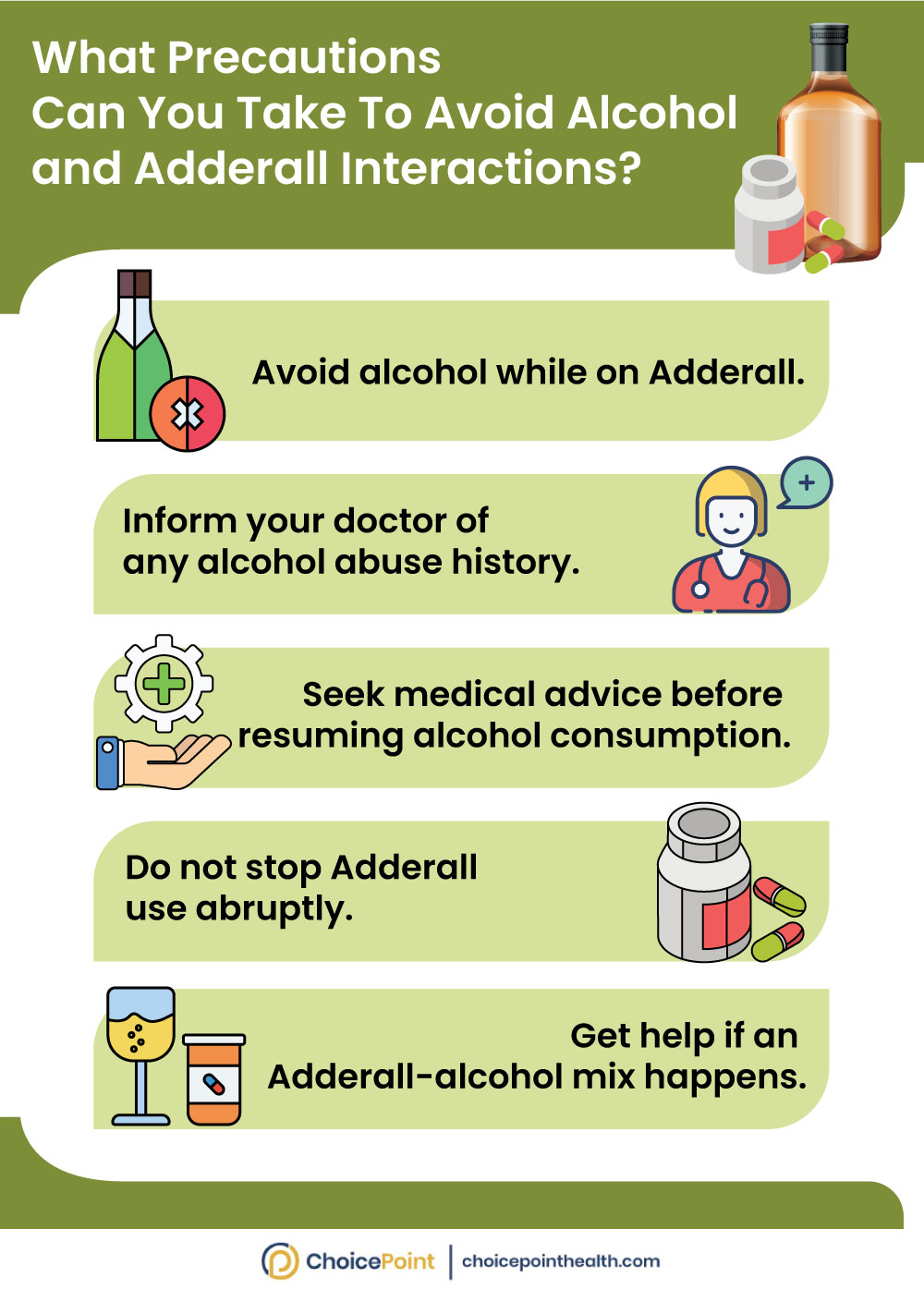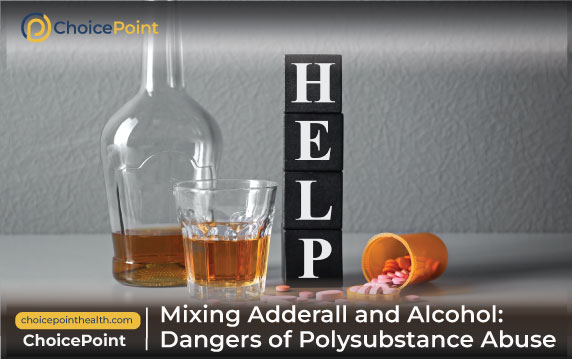Adderall, when used according to the prescription, is safe, but unfortunately, Adderall misuse is on the rise. The National Survey on Drug Use and Health reports that 3.7 million people aged 12 misused Adderall in 2020 to increase their concentration, lose weight, or experiment. Mixing Adderall and Alcohol can lead to:
- Adverse physical effects
- Psychological changes
- Cognitive decline
- Sensory reactions
Read on to learn how these symptoms can put your life at stake and what you can do if you have mixed the two substances, intentionally or unintentionally.
Table of Contents
Why Adderall and Alcohol Is A Fatal Duo?
Adderall is a legal prescription medicine used to treat ADHD ( attention deficit hyperactivity disorder) patients. Adderall consists of amphetamine salt, which makes it a stimulant. Being a stimulant, Adderall increases focus and improves cognitive abilities for people with ADHD.
Whereas alcohol is a depressant. Mixing a stimulant with a depressant can mask the effect of the other drug. You won’t know how much you have consumed the drug unless it results in a drug overdose, according to the Centers for Disease Control and Prevention.
What Happens When You Mix Alcohol and Adderall?
Using Adderall and Alcohol together is one of the forms of Adderall misuse, which falls under polysubstance abuse. Polysubstance abuse has more profound alcohol and Adderall side effects than single-substance abuse. Drinking alcohol while on Adderall can result in the following dangers:
a. Changes In Heart Functions
ADHD medication and alcohol already carry risks of impacting your heart. When you mix the two, the risk increases, which may initially appear as follows:
- Increase heart rate
- Elevated blood pressure
However, long-term use of alcohol and Adderall can drastically reduce the blood flow to the heart, leading to myocardial infarction.
b. Alcohol Poisoning
Since alcohol and Adderall work in opposite ways, one drug can hide the effects of the other substance. For instance, if Adderall masks the intoxicating effects at lower concentrations, then you would binge drink in a short time. Excessive alcohol can ultimately lead to alcohol poisoning, which appears as:
- Damage to the liver
- Changes in breathing
- Changes in heart rate
- Comma
- Wet brain syndrome
c. Behavioral Issues
Long-term abuse of Adderall-Alcohol can damage your central nervous system. It can increase the dopamine level to an extent where it becomes challenging to control your impulses. This can result in:
- Uncontrolled Aggression
- Jitters
- Blacks outs
- Trouble focusing
d. Worsened ADHD
Since alcohol is a depressant, long-term use of alcohol while you are on Adderall for ADHD can deplete your dopamine levels. It means although Adderall is trying to increase your dopamine and improve your concentration, Alcohol will not let this happen. This can can increase:
- Forgetfulness
- Confusion
- Anxiety
- Impatience
e. Involvement in other Drugs
“Long-term use of alcohol and Adderall can worsen your polysubstance abuse. It may also lead to other substance abuse as well, such as meth abuse, since it’s also a central nervous stimulant,” Paige Dommenge, a Registered Nurse, explains. Abusing Adderall, meth, alcohol, or any other nervous stimulant can cause:
- Interpersonal problems
- Increased involvement in risk-taking activities
- Excessive vomiting
- Coma
- Death in severe case
Are you looking for an addiction treatment center that helps with polysubstance abuse? You’re in luck! Call ChoicePoint today as we specialize in treating dual disorders 844.445.2565.

Adderall and Alcohol Interaction
3 Tips for Managing Polysubstance Abuse
Polysubstance abuse can distort your decision-making skills, compromising your judgment and bringing adverse alcohol and Adderall side effects. Even if you try to quit addiction to one substance, the drug craving for the other substance will bring you back to polysubstance abuse.
That’s why it’s important to make an informed decision for managing your polysubstance addiction.
#1: Seek Professional Help To Break Free From Substance Abuse
If you or your loved one are abusing Adderall and alcohol, then the number one step is contacting a rehab near you offering dual diagnosis treatment. Rehab Counseling Center can help you achieve remission and avoid any serious consequences.
#2: Eliminate Alcohol And Adderall Through Medical Detox
Addiction treatment at a rehab begins with eliminating alcohol, Adderall, and other harmful substances from your body under the supervision of licensed professionals. Medical detox often brings mild to severe withdrawal symptoms depending on your addiction history and the type of substance you have been abusing. The withdrawal process can last weeks or months, depending on the following:
- Severity of withdrawal symptoms
- Family History
- Frequency of drug abuse
- The number of drugs abuse
- Presence of other illness
Paige Dommenge, a Registered ChoicePoint Nurse, said, “You can go through a detox either in a residential treatment or an outpatient setting, depending upon your treatments and health status. Generally speaking, an outpatient program is the best bet for milder symptoms. But, when it comes to treating adderall alcohol cravings, we recommend an inpatient treatment because our focus is also on alleviating ADHD.”
Paige Dommenge, a Registered ChoicePoint Nurse, said, “You can go through a detox either in a residential treatment or an outpatient setting, depending upon your treatments and health status. Generally speaking, an outpatient program is the best bet for milder symptoms. But, when it comes to treating adderall alcohol cravings, we recommend an inpatient treatment because our focus is also on alleviating ADHD.”
So, it’s best to consult your doctor if you have ADHD. And, if you’re drinking Adderall and alcohol for fun, please avoid it to not fall into any of the dangers.
#3 Addiction Therapies
Polysubstance abuse needs time to shake off, and medical detox performs just a few initial steps of remission. To ensure you don’t relapse, you must learn skills to curb the Adderall alcohol cravings. Addiction therapy does the very same job. The choice of the right type of therapy will depend on your needs, but a few options include:
- Family Therapy: To improve your interpersonal skills and resolve family conflicts
- Cognitive Behavioral Therapy: To help you change negative thoughts and avoid aggression.
- Dialectical Behavioral Therapy: To aid you in managing stress, reduce cravings, and improve your overall well-being. It is particularly helpful in managing symptoms of ADHD, such as anxiety and lower concentration.
These sessions can either occur one-on-one or in groups, depending on how far polysubstance abuse has affected you. The skills learned through therapy will help you use the prescription medicines according to the prescription and avoid drug abuse triggers.
Signs of Adderall and Alcohol Addiction
There are two groups of people who combine Adderall and alcohol. One group combines it unintentionally and does not do it frequently. Meanwhile, the other group combines it frequently and intentionally. This group develops a potential addiction to the duo and experiences the dangers as well. According to the 5th edition of the Diagnostic and Statistical Manual of Mental Disorders, you are misusing stimulants and might have developed addiction if you:
- Don’t follow your Adderall prescription
- Take Adderall for recreational purposes
- Avoid family, work, and college responsibilities
- Have constant fluctuations in blood pressure and mood
- Misuse drugs despite knowing the alcohol and Adderall side effects
Please note this assessment is an initial self-screening, and it is not meant to be a medical assessment or clinical diagnosis of addiction. For proper diagnosis and treatment, schedule an appointment with ChoicePoint.
Co-occurring Addiction Treatment At ChoicePoint
ChoicePoint in Fair Lawn, New Jersey, provides a holistic treatment for co-occurring mental illness and polysubstance abuse, including Adderall and alcohol. If you or your loved one needs help overcoming addiction, then know that we are just a call away 844.445.2565.
Our staff and DEA-certified doctors are here to guide you through the admission process and provide support with treatment steps. Whether it is medical detox, inpatient treatment, or addiction counseling, we make sure to provide a comfortable environment that can help you attain lifelong sobriety.
Adderall and Alcohol: You Asked, We Answered
Here are a few commonly asked queries relating to alcohol and Adderall interactions:
What’s More Addictive, Alcohol or Adderall?
Adderall is more addictive than alcohol if used recreationally. Methamphetamine in Adderall causes a rapid release of dopamine in the brain, giving rise to an instant dopamine rush. This rush causes extreme Adderall cravings, leading to addiction.
Alcohol also causes an increase in dopamine, but since it is a central nervous depressant, it doesn’t increase dopamine to the same level Adderall does. However, long-term use of alcohol does lead to addiction with severe alcohol and Adderall side effects.
Is It Harmful To Occasionally Take Adderall For Enjoyment?
No, you should not take any medicine for enjoyment. Adderall is a central nervous stimulant. It can help with focus for people with ADHD, but it comes with various health risks. Taking Adderall without a prescription can lead to the following side effects:
- Loss of appetite
- Mood swings
- Heart issues
- Drug dependence
- Overdose leads to death
Can You Drink Alcohol On ADHD Medication?
You should not drink while on ADHD medication, such as Adderall. The two substances can negatively interact, leading to polysubstance abuse, with life-threatening alcohol and Adderall side effects.
Does Adderall Cause Liver Damage?
Adderall is safe to use according to the prescription. But an Adderall misuse can lead to Amphetamine overdose that can damage your liver.
How Long Does Alcohol and Adderall Stay In Your System?
Immediate-release dose Adderall stays around 4-6 hours, and extended-release doses take a day to get out of your system. It means even if you want to drink alcohol while on Adderall, you cannot do so unless all Adderall has left your body. At the same time, it can take around 24-26 hours for alcohol to be out of your system.
Additionally, some of the factors that determine how long these substances remain in your body are:
- Age
- Body weight
- Metabolism
References
- 1. Center for Disease Control and Prevention. Polysubstance Use Facts
https://www.cdc.gov/stopoverdose/polysubstance-use/index.html - National Institute on Drug Abuse. 2021. Misuse of Prescription Drugs Research Report
https://nida.nih.gov/publications/research-reports/misuse-prescription-drugs/what-scope-prescription-drug-misuse - National Center for Biotechnology Information. 2023. Myocardial Infarction
https://www.ncbi.nlm.nih.gov/books/NBK537076/ - National Institute on Alcohol Abuse and Alcoholism. 2023. Alcohol’s Effects On Health
https://www.niaaa.nih.gov/publications/brochures-and-fact-sheets/understanding-dangers-of-alcohol-overdose
Medical Disclaimer:
ChoicePoint aims to improve the quality of life for people struggling with substance use disorder and mental health issues. Our team of licensed medical professionals research, edit and review the content before publishing. However, this information is not intended to be a substitute for professional medical advice, diagnosis, or treatment. For medical advice please consult your physicians or ChoicePoint's qualified staff.










